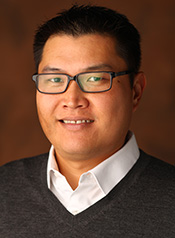Welcome to the APPAM Leadership Blog Series! Each month you will hear from our Executive Director, President or President-Elect, providing APPAM membership a behind-the-scenes look at how APPAM operates and how you can be more involved. Our authors will introduce new initiatives, discuss current policy topics and share resources they value.
Want to have a conversation? Follow @APPAM_DC and #APPAMLeaders on twitter!
 By Christopher (Kitt) Carpenter, APPAM Vice President
By Christopher (Kitt) Carpenter, APPAM Vice President
As an applied microeconomist who studies the causes and consequences of a range of public policies, I have always felt like APPAM is my primary intellectual home. Our journal is filled with research articles and spirited debates on policy topics I find interesting and important, and the Fall Research Conference is a wonderful way to see old friends, make new connections, and hear cutting edge public policy research from the top scholars and practitioners in the world. For me, APPAM has always felt like a perfect fit.
Part of this fondness, I think, goes back to my first experiences at the Fall Research Conferences in the early 2000's. A core group of scholars studying policy issues related to sexual minorities would organize a research session each year. Because there were so few of us doing this work, it was easy to reach out to those ‘usual suspects’ to see if they could contribute a paper.
In those days, it was not uncommon to have the LGBTQ session consist of three authors who presented and then discussed each other’s papers, and maybe an audience member or two. The sessions were good quality, but they were sparsely attended. It was hard to know whether it was lack of interest in the topics, poor scheduling, or something else.
And then something interesting started to happen. The next year at the APPAM LGBTQ session, those same audience members came back and were joined by one or two more. And the next year one or two more. In the mid-2000's we started informal ‘queer dinners’ at APPAM where individuals involved with and/or attending the session met for a meal at the conference. Those dinners grew from 3 or 4 people to 7 or 8 people; one year we had a group of 15.
Last year at the Fall Conference in Chicago we had what I think was our strongest session ever, and it included multiple PhD students working on related topics. It was also well-attended: I didn’t know the majority of the people who came, and that was a great feeling. Cut to preparations for this year’s Fall Research Conference and we had so much interest in LGBTQ-themed research that we submitted two distinct research sessions on topics ranging from same-sex marriage to LGBTQ housing discrimination. Relative to those first few years of mostly empty rooms, we have come a long way.
My APPAM experience with these LGBTQ sessions has spilled over into one of my other professional societies, the American Economic Association (AEA). If you’ve been following the profession, you know that we economists have had some longstanding challenges with diversity and inclusion, highlighted by recent research showing very poor treatment of women on an anonymous economics message board. This discussion has resulted in an AEA ad-hoc committee report to consider a professional code of conduct and a variety of efforts to address the lack of women and minorities in the economics profession, including a fall summit at Berkeley.
I have been fortunate to work with some other LGBTQ economists (several of whom are also active APPAM members) to help the AEA improve in this area as well. In the past few years we started an Ad Hoc LGBTQ Economics Working Group that produces a newsletter, organizes lunch discussions on diversity-related topics, maintains an active list-serve, and organizes research sessions for the AEA/ASSA conferences.
Those of us doing diversity and inclusion work within the AEA are trying to lean on and learn from our sister organizations, and there is still much good work to do. This past January at the AEA conference in Philadelphia (a conference much larger in size than the APPAM Fall Research Conference) we had the one of the first cohesive LGBTQ-themed research sessions accepted to the main AEA program that I can remember – a session my colleague titled ‘Pink Papers’.
It was a wonderful event, but the contrast with APPAM’s consistent and explicit support of similar sessions for the better part of the past two decades was notable. Other allied research organizations such as the Population Association of America have included many LGBTQ-related sessions for years, and the American Sociological Association even devoted its 2015 annual conference theme to ‘Sexualities in the Social World’. Needless to say, we economists have some serious ground to make up.
One of the things I like most about APPAM as an organization is how nimble it is: if you have an idea to improve existing equity initiatives within APPAM (such as the Equity and Inclusion Fellowships for the Fall Research Conference, the applications for which are being accepted until May 25th) or an idea for a new event, there’s a very good chance we will be open to giving it at least a trial run.
Case in point: there will be an LGBTQI and Allies Meet-Up/Happy Hour at the 2018 Fall Research Conference at 7:00 pm on Friday, November 9, after the Presidential Address and Awards event. I think it will be the first one in APPAM history; hopefully the first of many. I would love to see you there! And if you have experiences or ideas from other associations you have been a part of that could help APPAM achieve our diversity goals, it would be great to be in dialogue with you by email or in person at the Fall Conference. See you in DC!